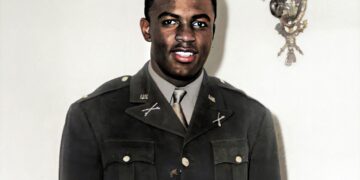Feb 7, 2025 Story by: Editor
Washington Commanders wide receiver Terry McLaurin took a moment to reflect before responding to a reporter after practice this season. “Now that you mention it,” McLaurin said, “I’ve never had a Black head coach in high school, college, or the NFL. Coordinators and position coaches only.”
McLaurin, like most NFL players, is Black and shares concerns with some of his colleagues about the scarcity of Black head coaches. A survey conducted by the Associated Press, involving over 65 Black players from 25 teams, found that more than a third—approximately 36%—felt discouraged or disappointed by the low number of Black head coaches. “Until you see more coaches,” Dolphins linebacker Anthony Walker Jr. said, “we’re all going to look at it the same way: There aren’t enough Black coaches.”
As the Kansas City Chiefs and Philadelphia Eagles prepare for Sunday’s Super Bowl, both starting quarterbacks are Black. However, neither team’s head coach is. Panthers safety Nick Scott compared this to the past reluctance of NFL teams to embrace Black quarterbacks. “They were labeled as not as cerebral. That was the narrative. But I don’t know how you go about changing that (for coaches),” Scott said. “I would hate for it to turn into some affirmative action thing where people are getting pushed into a job whether they are qualified or not. So it’s a tricky balance, right? … But I think there are plenty of guys who are qualified.”
At a time when President Donald Trump has sought to eliminate federal diversity, equity, and inclusion (DEI) programs, and several major companies have scaled back DEI efforts, NFL Commissioner Roger Goodell reaffirmed the league’s commitment to diversity initiatives. Some players interviewed by the AP highlighted the contrast between the racial makeup of NFL players—53.5% of whom were Black in 2023, according to The Institute for Diversity and Ethics in Sport (TIDES)—and that of head coaches, who comprised just 22% at the start of the season. That percentage is expected to drop to 19% next season (six out of 32 teams), depending on the New Orleans Saints’ final hiring decision.
“You can’t just overlook that discrepancy,” McLaurin said. “Obviously you want the best candidate for the job, whether it’s someone who is Black, white, Asian, or whoever. However, when you have a big representation of African-American players that are in your league, you would like to see that represented in coaching as well.”
Which NFL Teams Have Never Had a Black Head Coach?
Excluding interim appointments, McLaurin’s Commanders are one of 11 franchises that have never hired a full-time Black head coach, alongside the Bills, Cowboys, Giants, Jaguars, Panthers, Rams, Ravens, Saints, Seahawks, and Titans—making up about a third of the league.
“No! Are you saying most Southern teams have never? That’s crazy! How many have never drafted a Black quarterback? Have you done that one?” Saints defensive end Cameron Jordan said. “There’s obvious franchises that won’t hire a Black coach.”
From 2000 to 2024, an AP analysis found that only 31 of 173 new NFL head coaches—just 18%—were Black. Cowboys special teams player C.J. Goodwin acknowledged the challenge, saying, “You’d be blind not to be discouraged. Black coaches can do it, can get the job done. … You don’t want to have the glass ceiling.”
Meanwhile, Raiders defensive end Malcolm Koonce expressed a different perspective. Speaking for the 58% of surveyed players who answered “No” when asked if they were discouraged (6% were unsure), he responded, “It’s like eyebrow-raising when you actually hear the number, but it’s not discouraging.”
Black Coaches and Turnover in the NFL
Two out of the three new Black head coaches hired in recent years were dismissed. The season began with seven Black head coaches: holdovers Mike McDaniel (Dolphins), Todd Bowles (Buccaneers), DeMeco Ryans (Texans), and Mike Tomlin (Steelers), alongside new hires Antonio Pierce (Raiders, who started as an interim coach), Jerod Mayo (Patriots), and Raheem Morris (Falcons). However, Pierce and Mayo were both fired in January. Of the six head coaches hired this offseason, only one—Aaron Glenn (Jets)—is Black.
“It’s still like, ‘Oh wow, it’s a Black coach!’” Jets defensive lineman Solomon Thomas said. “In a league that’s predominantly Black, I definitely believe there should be more.”
Brandon Brown, director of TIDES, explained why many players feel this way. “We always need to continue upward progress. Anytime you see downward progress, it’s a bit discouraging,” Brown said. “In talking to people at the NFL, there is no lack of trying to be diverse in their hires. What that eventually looks like is one thing.”
How Does the NFL Compare to Other Leagues?
The NBA, where about 70% of players are Black, has 11 Black head coaches out of 30 teams—roughly 37%. In Major League Baseball, only three of 30 teams have a Black manager. The NHL, with its 30 teams, has had just one Black head coach in history—Dirk Graham, who was dismissed during his lone season with the Blackhawks.
Nearly 40% of NFL players surveyed by the AP expressed interest in becoming a head coach, while others leaned toward assistant coaching or working at the college, high school, or youth levels. More than 90% of respondents were encouraged by the number of Black coaches hired in full-time positions last offseason, as the three appointments tied for the most since 2000.
The Rooney Rule and Its Effectiveness
Established in 2003 and named after the late Steelers owner Dan Rooney, the Rooney Rule was designed to promote diversity in coaching and front-office positions by requiring teams to interview minority candidates.
“The Rooney Rule’s a great rule,” Washington’s McLaurin said, “but … from what I’ve heard, some teams kind of use that to check a box, which is unfortunate, instead of using the rule the way it was intended.”
This issue is central to the 2022 lawsuit filed by former Dolphins head coach Brian Flores—now the Vikings’ defensive coordinator—against the NFL and three teams, alleging discriminatory hiring practices.
Steelers defensive tackle Cam Heyward shared his perspective: “I knew what Mr. Rooney was trying to accomplish with that. And so to see people work around it and say, ‘Well, this guy was already getting the job, we’re just (talking to a Black candidate) to appease the many’—I don’t think that’s right.”
Recent head coach searches by the Patriots and Jaguars raised concerns, with some interviews seen as mere formalities to satisfy the Rooney Rule’s requirements.
“We follow up with the candidates,” Goodell said. “We speak about the sincerity and the thoroughness of an interview to make sure that we’re doing that in the proper fashion.”
Why Are There So Few Black NFL Coaches?
Some, like Ravens safety Kyle Hamilton, believe networking and nepotism play a major role. “For Black people in this league, it’s an uphill battle. … There’s been a plethora of white head coaches over the course of the history of the NFL. Those coaches have sons who get into coaching,” Hamilton said. “Look at the big Shanahan tree. No disrespect to them, but they have a step up in the business. It’s not about what you know, it’s about who you know. … Black people have kind of been behind.”
Others see the issue as a reflection of broader societal trends. “It’s just American society,” the Cowboys’ Goodwin said. “That’s more of a societal question than it is a question about the NFL.”
Source: Alarabiya News
















